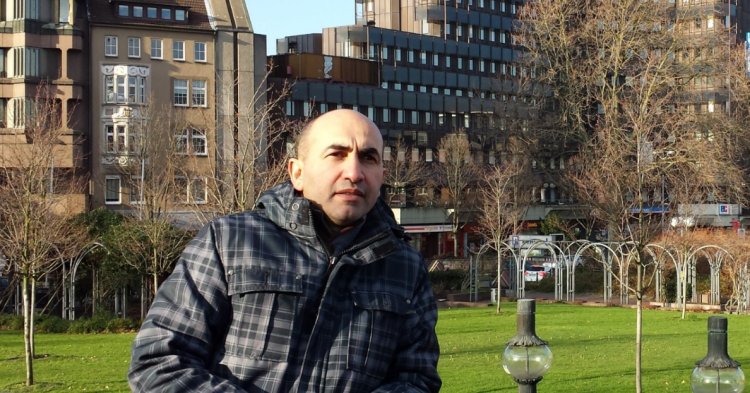Some background context
Azerbaijan is a small country with a population of around 10 million, situated in the South Caucasus region between Eastern Europe and Asia. After the communist era, the formerly Soviet Union-controlled country came under the authoritarian rule of Gaydar Aliyev, and, since 2003, his son Ilham Aliyev. Since then, Azerbaijani politics have been tarnished by corruption and human rights violations. Most recently, the country made headlines because of a German CDU politician: Karin Strenz stands accused a conflict of interest by the Council of Europe. She has been exceptionally uncritical of Azerbaijan, allegedly receiving money from the authoritarian state in return. For the time being, however, Azerbaijan faces domestic political challenges: President Aliyev called early parliament elections which took place on 9th February, but which were boycotted by the main opposition forces.
This interview follows the one with Anar Orujov, an Azerbaijani journalist who also fled to Germany to escape the authoritarian regime, published in The New Federalist and our German sister publication Treffpunkt.
Mr Abdullayev, can you briefly explain the political circumstances in Azerbaijan and the background of these parliamentary elections?
Azerbaijan is an autocracy. President Ilham Aliyev controls all important political processes in our country and organizes these elections only as political theatre. In a staged election, boycotted by large parts of the opposition, candidates loyal to the regime will prevail and help him to continue his rule, which he has held since 2003. There are no democratic rights in Azerbaijan, and Aliyev effectively prevents the emergence of a strong opposition that could be dangerous for him.
How does Aliyev manage to suppress political opponents?
He does not give them a platform to reach the citizens. The Azerbaijani media landscape is largely controlled by him and critical media are intimidated and disadvantaged: we are ranked 166th in Reporters Without Borders’ Freedom of the Press ranking. Many journalists but also regime critics in general are imprisoned in Azerbaijan. Furthermore, there is no freedom of assembly, there is only one remote place outside the city centre of Baku where demonstrations can take place.
What kind of persecution have you experienced yourself?
I was arrested and tortured in 2003 after I pointed out irregularities as an election observer. In the course of a large wave of arrests of opposition members, I was persecuted in 2014 because of alleged VAT fraud at my NGO. Our financial resources were frozen and I faced the threat of being arrested. Such fabricated accusations were also made against many other regime critics, often for alleged tax evasion, but also for drug possession or the like. In the end I was forced to leave my country, and now I am trying to continue to work from exile for a democratic Azerbaijan.
Azerbaijan is a country with large gas and oil resources. What role do these raw materials play in keeping Aliyev in power?
The control over oil and gas reserves is crucial for Aliyev and the rest of our political elite. The money from the state-owned oil fund is used to keep Azerbaijan’s corrupt system alive. Moreover, the wealth of resources enables Aliyev to exercise power internationally. The EU now imports large quantities of oil and gas from Azerbaijan and finds itself in a difficult balancing act between the call for democracy and human rights and its dependence on raw materials supplies.
In countries such as Saudi Arabia or Kuwait, for example, where the population does not have to pay high taxes due to the wealth of raw materials, and where the government can fund a generous welfare state, autocratic systems seem to hold up particularly well. Do you sometimes wish that Azerbaijan had no such wealth in terms of natural resources?
I would not go that far. Instead, I wish that our large resources were under democratic control and could benefit the whole population.
Is there an awareness in Azerbaijan of the problem that a one-sided economic focus on fossil fuels is not sustainable in view of the climate crisis?
Our government does not care about that at all. In particular, the environmental pollution caused by oil production and lack of regulation has already reached worrying proportions. Air quality is also poor because we use particularly a polluting gasoline. In addition, a great deal of forest has been cut down in the past. But under Aliyev, I unfortunately see no hope for improvement here.
How do you campaign in Germany for a democratic Azerbaijan?
Together with more than 100 political asylum seekers living in Germany and other European countries, I founded “DAS - Demokratik Azerbaycani Sec!” (Vote for a Democratic Azerbaijan!) in June 2018. We want to be the lobby of the democratic Azerbaijani opposition in Germany. The main goal of the organization is to support the democratic processes in Azerbaijan and to raise public awareness of human rights violations. In order to achieve this goal, we monitor all trials against activists taking place in the country, hold political rallies on human rights violations, publish statements and pass on information to international organizations. Above all, we want to raise awareness of human rights violations in our country and call on German and European politicians to exert more pressure on the Azerbaijani government to respect human rights.
How does the Azerbaijani government react to your activism?
Our commitment makes us a target of the Azerbaijani regime and many of our members’ families in Azerbaijan have been put under pressure and some of them have even been arrested. However, we will not let this intimidate us and we will continue to work for democracy in Azerbaijan. Unfortunately, we have not been noticed very much so far, but in future we want to demonstrate more and launch social media campaigns. Our country has the potential for a democratic turnaround - after all, we had already introduced women’s voting rights in 1918 - and thus before Germany. But we need more international pressure and we need to organize ourselves better. That’s what I am working for.


Follow the comments: |
|
